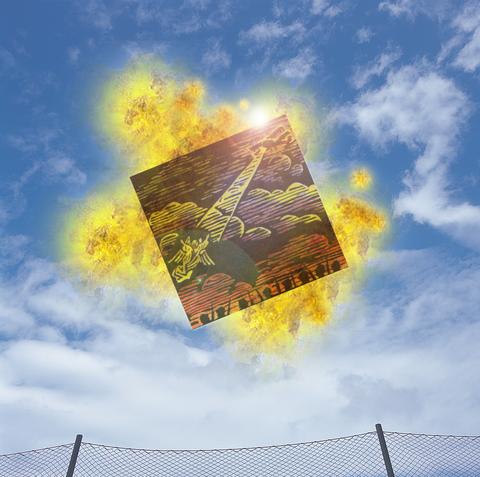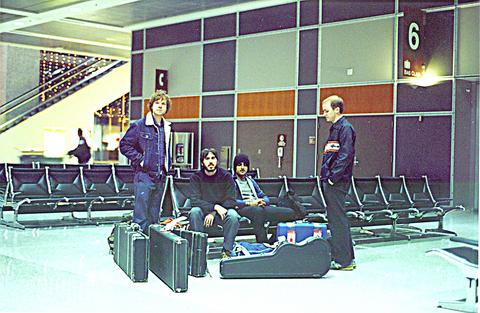An album called Those Who Tell the Truth Shall Die, Those Who Tell the Truth Shall Live Forever was released on Sept. 4, 2001, but since promotional copies did not reach critics and magazines until some days later, a story arose that the album had actually been released on Sept. 10. The album was themed on war and ended with a track called Plane Will Crash Tomorrow. The band that produced it was called Explosions in the Sky.
"People who listen to the album find it to be a bit eerie," said Munaf Rayani, one of two guitarists in the Austin, Texas-based band. "And it's eerie to us too that it all came out that way, because we came up with the title a year before, you know, this tragedy. The album was ready to go seven months prior to everything."

CD COVER COURTESY OF TEMPORARY RESIDENCE
Tomorrow night and Sunday afternoon, Explosions in the Sky will play shows at Taipei's Zeitgeist, with local bands opening.

PHOTO COURTESY OF ANGELS-GONE.COM
The performances have been organized by Wu Hsiao-hwa
In a lot of ways, Explosions' sound is a natural draw for the moody core of Taipei's underground rock scene, a fan base that's been proud of venerating bands like Yo La Tengo and Mogwai.
Though Explosions is still only two-albums-old, many US reviewers see it as a successor to Mogwai (formed 1995) and Godspeed You Black Emperor! (formed 1994), the two biggest names in instrumental post-rock. But when they call Explosions "awesome," it's still probably more out of anticipation than achievement.
The post-rock genre is based on traditional rock instruments, but seeks out a fuller range of emotions in music, not just the quick, ecstatic high that rock is known for. Often cinematic in feel, post-rock also has cast aside the cynicism of punk and 80s/90s alternative and, more often than not, gotten rid of the lyrics along with it.
"Our two big ideas that we shoot for are sadness and triumph, and in those two, I don't know if cynicism fits so well," said Rayani.
Explosions' record label, Temporary Residence, describes the band's sound as "silence to violence." Rayani explained it: "I don't want to sound lame or arty or anything, but we do our best to sing with our guitars. Like [the guitar lines are] supposed to be the vocal melody."
In a way, the expressive movement is larger than rock, popping up everywhere from the brutal, show-all revolution of digital filmmaking to the natural, statistical emphasis of contemporary science and philosophy. The yearning is toward a purer, more direct language, a thought Rayani expressed when he welcomed the idea of coming to Taipei and not knowing how to speak Mandarin: "I almost prefer that we be not really able to communicate through language. I want to be in a place where I don't know what everybody is saying all the time."
But on a more day-to-day level, what all this zeitgeist has meant for indie music and the kids of America is lots of post-rock bands.
"Why Mogwai and Godspeed are so important is that they really changed the face of music," said Rayani. "In the [last] three months that we've been touring, we have discovered sooo many instrumental rock bands. ... It's almost like how Sonic Youth changed music."
Explosions was formed in July 1999 by Rayani (guitar), two friends he grew up with in Midland, Texas, Mark T. Smith (guitar) and Michael James (bass) and Chris Hrasky (drums). They came together in Austin, home of slacker culture and the richest indie music scene in the American southwest.
With the Taiwan shows, the band will be coming to the end of nearly four months of touring, including about six weeks in Europe.
"This is our best tour yet. We actually came home with rent money," said Rayani.
For Explosions, day jobs are still necessary between tours and when they travel, it's in a clunky, loveable and fully carpeted Dodge Family Van with four captain's chairs.
On the latest tour, a milestone for the band was opening a Houston show for Fugazi in front of 2,000 people, the biggest crowd they've ever played for.
Behind the music, Explosions' songs are often inspired by movies or world events and are heavy in narrative overtones. One track on Those Who Tell the Truth contains a lengthy soliloquy from The Thin Red Line, and another coming out on the next album, Six days at the Bottom of the Ocean, was inspired by the 66-man crew of the Russian submarine Kursk, who were trapped and suffocated on the sea floor.
So maybe one can imagine the spooky resonance people found between Explosions music and the events of Sept. 11, 2001, especially with the freakishly coincidental release of Those Who Tell the Truth.
To be honest, Rayani thinks it was good for the band, mostly because it got them lots of publicity. Around 30 college radio stations refused to play them, he said, and a major music magazine, NME, ranked them second on a list of bands in need of a name change.
But if anything, what was behind Those Who Tell the Truth was more Austin irony, less prophetic subversion. They got the album name from a guy working at Star Seeds, a well-known Austin cafe, who described to them a documentary about the assassination of his favorite filmmaker, Pier Paolo Pasolini. He said the film was called Those Who Tell the Truth Shall Die.
"And we were, like, that's about the greatest title I've ever heard in my life," said Rayani. But the band changed it a little, taking into account the power of the words and acts of the martyred. So they added the second phrase: "Those Who Tell the Truth Shall Live Forever."
Later they discovered that the documentary whose title they stole had never even existed. Now is that eerie or irony? They'll probably choose to describe it as the former.
What: Explosions in the Sky
Where: Zeitgeist, B1, 122 Chunghsiao E. Rd., Sec. 2, Taipei
When: Tomorrow 8pm and Sunday 3pm
Tickets: NT$950 through Acer ticketing

Taiwan has next to no political engagement in Myanmar, either with the ruling military junta nor the dozens of armed groups who’ve in the last five years taken over around two-thirds of the nation’s territory in a sprawling, patchwork civil war. But early last month, the leader of one relatively minor Burmese revolutionary faction, General Nerdah Bomya, who is also an alleged war criminal, made a low key visit to Taipei, where he met with a member of President William Lai’s (賴清德) staff, a retired Taiwanese military official and several academics. “I feel like Taiwan is a good example of

March 2 to March 8 Gunfire rang out along the shore of the frontline island of Lieyu (烈嶼) on a foggy afternoon on March 7, 1987. By the time it was over, about 20 unarmed Vietnamese refugees — men, women, elderly and children — were dead. They were hastily buried, followed by decades of silence. Months later, opposition politicians and journalists tried to uncover what had happened, but conflicting accounts only deepened the confusion. One version suggested that government troops had mistakenly killed their own operatives attempting to return home from Vietnam. The military maintained that the

Before the last section of the round-the-island railway was electrified, one old blue train still chugged back and forth between Pingtung County’s Fangliao (枋寮) and Taitung (台東) stations once a day. It was so slow, was so hot (it had no air conditioning) and covered such a short distance, that the low fare still failed to attract many riders. This relic of the past was finally retired when the South Link Line was fully electrified on Dec. 23, 2020. A wave of nostalgia surrounded the termination of the Ordinary Train service, as these train carriages had been in use for decades

Lori Sepich smoked for years and sometimes skipped taking her blood pressure medicine. But she never thought she’d have a heart attack. The possibility “just wasn’t registering with me,” said the 64-year-old from Memphis, Tennessee, who suffered two of them 13 years apart. She’s far from alone. More than 60 million women in the US live with cardiovascular disease, which includes heart disease as well as stroke, heart failure and atrial fibrillation. And despite the myth that heart attacks mostly strike men, women are vulnerable too. Overall in the US, 1 in 5 women dies of cardiovascular disease each year, 37,000 of them